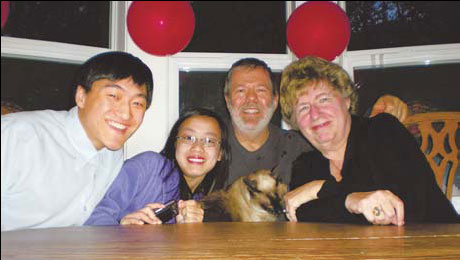Joy and pain for special needs adoptions
By Tan Yingzi and Lian Mo (China Daily)
Updated: 2010-07-12 10:21
 |
Large Medium Small |

It was love at first sight for Jill Crouch when she saw the 1-year-old Chinese boy in Nanjing, Jiangsu province, in December 2008.
"We weren't sure what to expect but we were very excited to meet this beautiful little boy we'd known only through pictures for seven months," Crouch told China Daily.
Timothy, now 2 and a half, is a special-needs child with a cleft palate who was abandoned by his parents because they could not afford the medical cost.
"We are very lucky to have Tim," she said. "With him, we finally have a family."
For Crouch and her husband Greg Kissel, a successful businessman, the medical cost to fix the disability is affordable, and nothing can stop their love for the boy.
"He always surprises us with his cleverness, sense of humor and sweetness," said Crouch. "He was so brave and did not even cry during the operation. He was very scared and unhappy, but remained calm. I was amazed by his courage."
Crouch's sister, who adopted a Chinese girl, paved the way for the couple, and they decided to adopt a special-needs child. "We suppose there would be less corruption in the adoption of special-needs kids," Crouch said.
Though her husband was initially not very sure about the idea, they did some research about cleft palates, specifically from the Cleft Palate Foundation.
"Also I was able to explain some of the concerns and special challenges related to cleft palate babies," said Crouch, who is a nurse. Once he was better educated he was excited about the opportunity. "We were always open to a child of either gender and when the opportunity came to adopt our little boy we were very happy."
To adopt a special-needs child, approval from a social worker was also needed, but in less than a year, Timothy went to the US with his foster parents. The family is now working hard on the boy's recovery from the operation.
In recent years, more and more American couples like Crouch and her husband have chosen to adopt special-needs children from China. Since 2000, US citizens have adopted more babies from China than from any other country. Last year, more than 3,000 children from China were adopted by couples in the United States.
However, the figure has fallen dramatically from nearly 8,000 in 2005, data from the US Department of State said. So far, almost 60,000 Chinese children have been adopted by American couples, the Chinese embassy in Washington DC said.
Nearly 90 percent of them are girls, with 44 percent under the age of 1, and 52 percent between 1 and 4 years old.
However, many adoptions involve children with special needs, medical problems or are older. These kinds of adoption usually take a shorter time.
Typically, inter-country adoption procedures will take about three and a half years, although it may now be even longer, with applicants facing more paperwork and higher standards after China imposed changes in qualifications.
Dwyatt Gantt, the executive director of Children's Hope, International (CHI), one of the biggest adoption agencies in the US, said nearly 60 percent of these adopted children are disabled or older than 5, and even before China tightened its adoption policy in 2005, about one third had special needs.
Melody Zhang, CHI's associate director, said orphans with special needs or who are older are generally more vulnerable physically and psychologically.
Li Jun, now 22, was adopted by a Jewish couple from Seattle, Washington, in 1994 when he was 6. Two years ago, he returned to China to seek his roots after graduating from Evergreen State College in Olympia and is teaching English at Capital University of Economics and Business in Beijing. He said his foster parents love him very much.
Li's foster parents have two daughters. When Li was adopted, the girls had grown up and had left home.
"I guess my parents were worried that I would feel lonely as a Chinese kid in a new environment and they adopted another boy a year later," he said. "Then my mother thought she would need more girls in the family to support her, they adopted a girl."
Both of them were adopted when they were 8, and also came from Jiangsu province, with the boy, Li Xiang, from Suzhou and Gabrielle from Nanjing. To help the three adoptive children catch up with local students, Li's mother quit her senior executive job in Microsoft to work from home and tutor them.
Despite the love Americans shower on their adoptive children, there are still problems, Huang Hai, a social worker and founder of the website daaiwujie.org, said.
Huang, who has researched the situation of more than 3,000 adopted Chinese children in the US, is trying to establish the Angels Alliance Foundation to help these children cope with the problems they face in adapting and growing up in a new country. "Children with special needs, or those adopted at an older age, are even more likely to have psychological problems, including a low sense of identity and getting hurt when they are bullied in schools or by adoptive parents in some rare cases," Huang said.
Tan Yingzi reported from Washington and Lian Mo reported from Beijing.